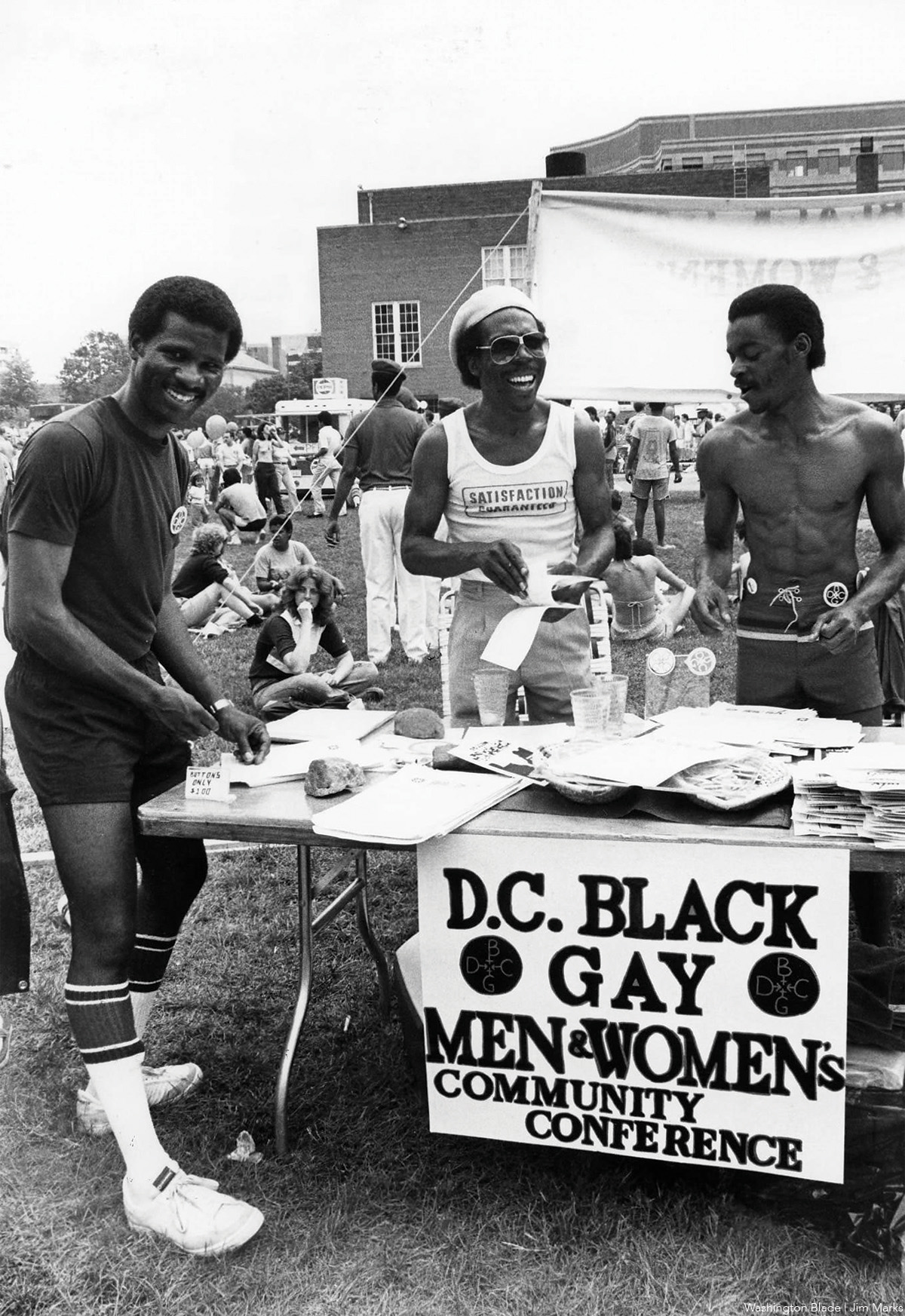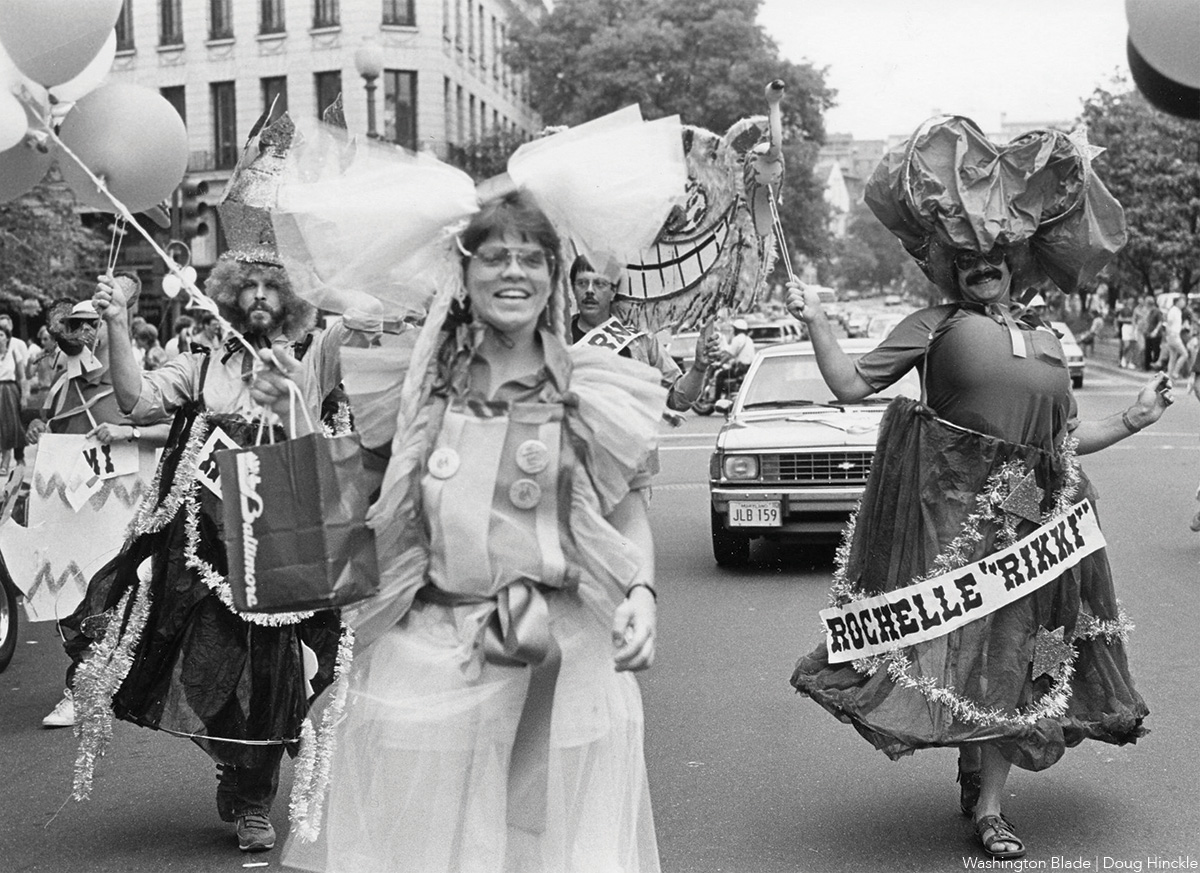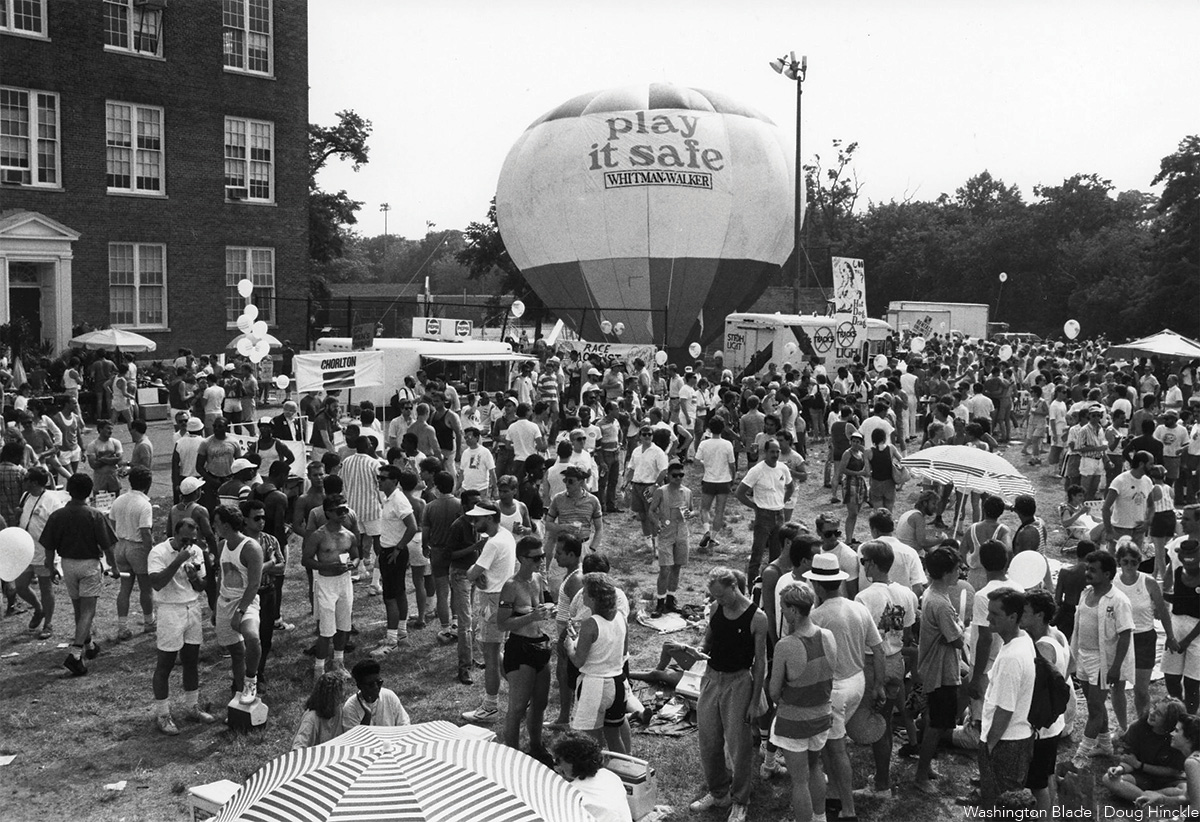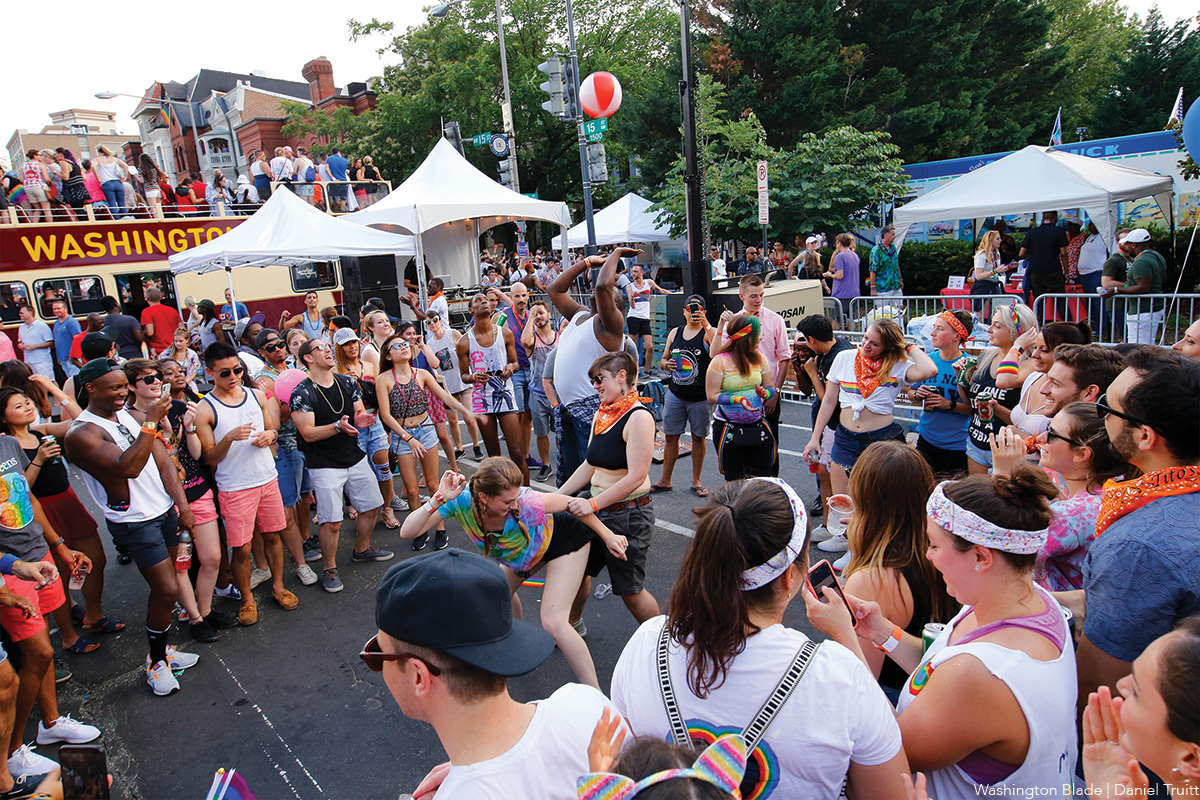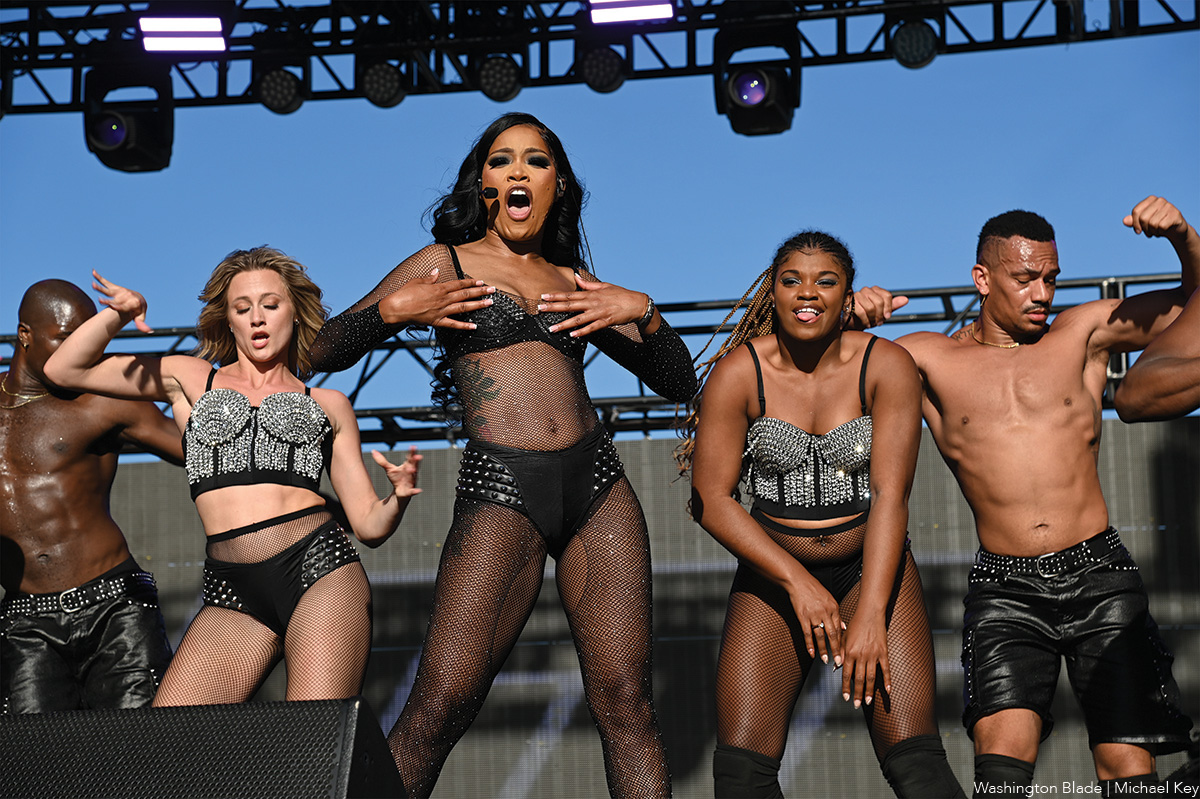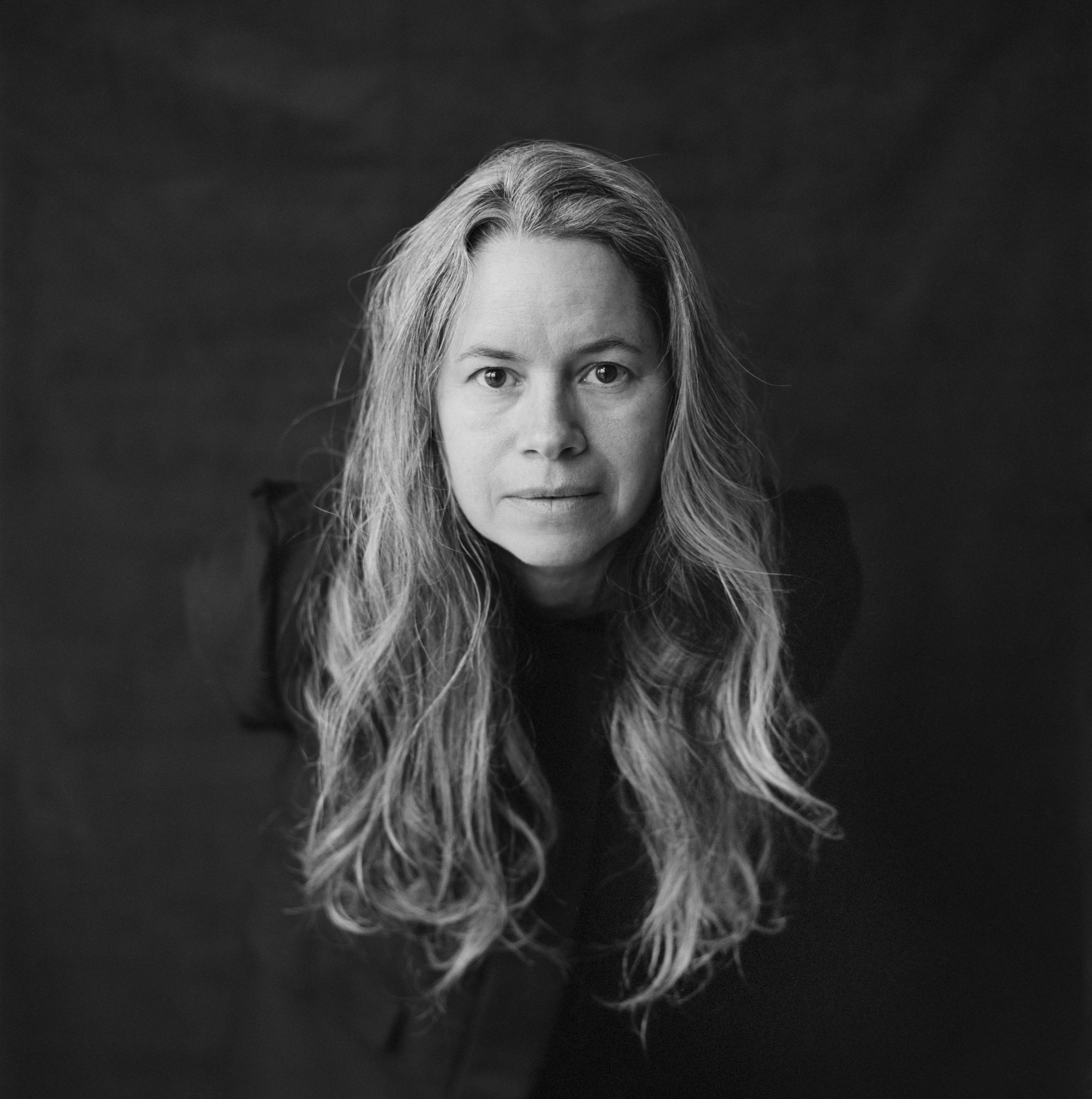a&e features
Natalie Merchant goes deep
Former 10,000 Maniacs front woman curates solo career with new box set
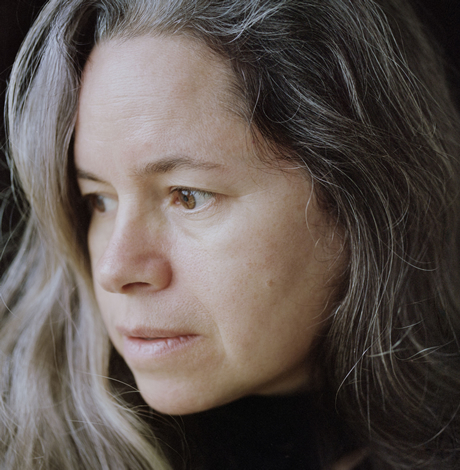
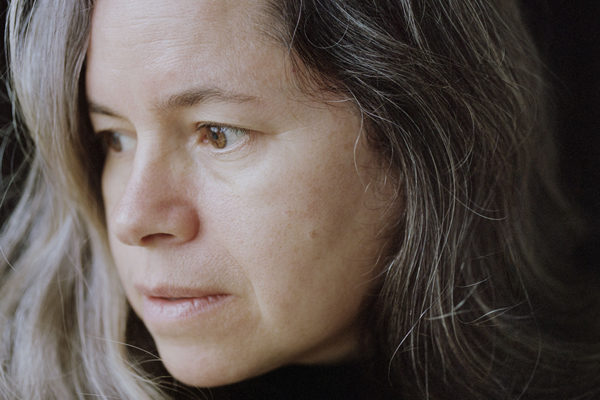
When working on her new box set, Natalie Merchant says it was important to her to maintain a high quality throughout. (Photo by Jacob Blickenstaff; courtesy Nonesuch Records)
Natalie Merchant
Summer Tour 2017
‘3 Decades of Song’
Thursday, July 6
8 p.m.
Wolf Trap
Filene Center
1551 Trap Rd.
Vienna, Va.
$30-75
Natalie Merchant, a ‘90s radio mainstay and former lead singer of 10,000 Maniacs, is sort of “bookending,” as she puts it, her solo material with the release of a new box set.
Out July 14 (postponed from a planned June release), “The Natalie Merchant Collection” is a deluxe, 10-CD box set that features her eight solo albums, a new studio disc called “Butterfly” that features four new songs and six catalogue tracks re-recorded with a string quartet, as well as a full disc of rarities and outtakes.
Merchant brings her summer tour to Wolf Trap on Thursday, July 6. She spoke to the Blade by phone last week from her home in upstate New York.
WASHINGTON BLADE: Why did you feel now was the right time for such a lavish box set?
NATALIE MERCHANT: It was a combination of factors. I feel that we’re definitely in the twilight moments of recorded music in the physical realm. As much as people talk about the resurgence of an interest in vinyl, I think that’s a small cult. So I felt like if I didn’t do it soon, there might not be an audience for it. I’ve also been steadily making records since the late ‘90s that have been a bit under the radar and I thought this would be an opportunity to combine all the work in one place for people who might have been familiar with what I was doing 20 years ago to see what I’m doing today.
BLADE: Was it hard to find a deal for it?
MERCHANT: Actually the suggestion came from Nonesuch a couple years ago because Nonesuch is owned by the same parent company as (her former label home) Elektra, so this idea of consolidating the whole catalogue under one roof was suggested and I thought that was a great idea. Elektra kind of folded for several years and I did feel like a lot of the records had gone out of print. Even my independent release, “The House Carpenter’s Daughter,” copies of it sell for like $50 online, which seemed silly to me because it’s really not worth that (laughs). It just felt like there were so many different factors. And also, when I did “Paradise is Here,” (a 2015 re-recording of breakthrough album “Tigerlily”), I went through all my archives, all the music, all the video, all the photography, so I had all these assets and I’d recently sort of curated them all, so this gave me an opportunity to put the book together. I just got it in the mail today.
BLADE: Oh wow, how does it feel to have it in your hands?
MERCHANT: It’s heavy! It feels very substantial. That’s my first impression. And my second impression is that it’s really so different from looking at a group of virtual files on a computer screen to have this whole thing in your hand and this 100-page book. It feels like a substantial amount of work that I think can get really distorted when you’re looking at it digitally. … It feels great.
BLADE: Did you have all this stuff yourself or did you have to round it up from various sources?
MERCHANT: It was interesting. One thing people might notice when they get the box set, is that it’s a different cover for (second solo album) “Ophelia” because the original photo was lost. Even Warner Bros. didn’t have it in their archives. I event went back to the original photographer, I went back to the original art director. I was the only person who had a lot of these assets. Also, I don’t want to sound morbid, but some day I’ll be dead and I wanted to make sure the material was presented in a way that I wanted it to be presented. I found it kind of shocking that they’d lost my art work but luckily I’m a bit of a pack rat, so I had many of the things that were necessary for this package in my basement including all the rarities which were in my own files at home.
BLADE: Do you feel a little more freedom to go deeper with your set list on your summer tour since you’re essentially touring this box set?
MERCHANT: If you include the 10,000 Maniacs songs, I’ve probably written about 250 songs. So yeah, it’s difficult to put together a set list of 26 or even 30 songs that are going to make everyone happy. But I think it’s going to be a really interesting set. I’m carrying a string quartet, piano, guitar, bass and drummer. It’s a big band and I think people will be pleasantly surprised by the arrangement of the material they know and to also hear some things they may not be familiar with.
BLADE: You sang at an anti-Trump rally earlier this year and have always been politically active. Why was that event important to you?
MERCHANT: It’s very disturbing what’s happening in our country right now. I believe that rally was on the even of the inauguration and I was in New York near Trump Tower. It was announced, I think, just two or three days before and we had 30,000 people there. That was encouraging and the next day was the women’s march and that was further confirmation that those of us who really sensed that the election of this man was extremely dangerous, you know, to have that many people show up in Washington the day after and protest was really encouraging. I’m hoping that we win back the House in 2018 at the very least. That would be a step forward. I don’t know about impeachment. I don’t know if that’s going to happen or how much things would improve if we have President Pence. So it’s frightening, really frightening, especially when he stepped away from the Paris accord. We don’t have time to mess around at this point. We have to transition from being a fossil fuel-based, energy-consuming country or we will not survive. It’s just really horrifying to think that we now have a president, whether he thinks global climate change exists or not, who would do that. That, to me, is the most important issue. But there’s women’s issues, there’s the health care issue, it’s overwhelming that there’s so many different fronts now and that we have to be fighting on. But I think without stabilizing the environment, or at least severely reducing the negative impact we’re having on the environment, we’re all fucked.
BLADE: Tell me more about the “Butterfly” disc. Of all the new material you might have recorded, why did you go with the string quartet approach?
MERCHANT: Since 2008 I’ve been doing orchestral shows and quartet shows almost exclusively so when it came time to make this record, I think there are about 40 songs now that I have string arrangements for. I had the entire “Paradise is There” album, celebrating the 20th anniversary of “Tigerlily,” so I’d used several of the arrangements on that record, so this was an opportunity to do that with some of those other songs in the new arrangements that had never been recorded.
BLADE: Sometimes long-time fans balk at these kinds of sets and say, “Oh, she’s making us buy all this stuff we already have just to get the new material.” Was that a concern?
MERCHANT: I think the fan that has every single thing I’ve ever released is rare. I think most people will be kind of grateful, at least I am when there’s an artist I’m interested in, I may not have everything they’ve ever released. I buy a lot of box sets because I’ve missed some of the pieces and I guess I’m kind of the personality who’s a completist. I like to have complete sets. And people will be able to digitally access the two new (discs) if they want. There’s also talk of a vinyl version (of the new material) coming out in the fall, so that’s another opportunity, but I don’t know. We’ll have to see. I also insisted it be very reasonably priced. I wanted it to be $50 or less.
BLADE: That’s certainly fair for a 10-disc set.
MERCHANT: And I think Amazon will be selling it for $40-something.
BLADE: Did you have any creative battles at Elektra or did they pretty much let you do your thing?
MERCHANT: Well, two interesting things happened. When I went solo, Bob Krasnow, who’d been the chairman of the company the entire time I’d been on Elektra, I can’t remember under what circumstances he departed, but he was gone and Sylvia Rhone came in and I think Sylvia was eager to prove herself and she really liked the song, “Carnival.” She’d been responsible for breaking a lot of African-American bands and artists but not a white artist and and I think that was her challenge and she loved that song so that was a stroke of luck. And I heard that Jon Landeau, who’d been executive managing Bruce Springsteen since the beginning of his career, Bruce was taking a hiatus so Jon started managing me, so I had this encouraging situation at the company and had great management, so I felt protected and respected. I didn’t feel it was an antagonistic relationship with Elektra at that point. I think I’d proven myself with three platinum records with 10,000 Maniacs.
BLADE: Did you choose the singles or the label on your first few albums?
MERCHANT: I think it was pretty obvious what the singles were on the first record. I don’t remember there being any discussion of that. I think with (third album) “Motherland” (2001), I wasn’t happy with a couple of the choices, but the first couple albums, it was fine. At that point, I was 30 years old, I’d been with the label since I was 19 and to be honest with you, I’d outlives just about everybody who worked at the label except the woman who ran the publicity department. I think we were the last two standing by the time it folded (laughs). … As people started doing more and more file sharing, the art department disappeared, the video department, it felt like departments were disappearing weekly until eventually the label just folded.
BLADE: Will you keep making records or is this set a sort of a bookend for you?
MERCHANT: It’s a little bit of a bookend because I’ll never be able to make records the way I did before. That leisurely two months in the studio, that’s just unheard of. “Leave Your Sleep” (2010) was the final project that I did on that scale and it took a full year to make that record. I employed, I think, 135 different musicians and it was folly in a way, but it was a beautiful folly. I still haven’t recouped and that was seven years ago (laughs). I felt like Orson Welles making “Citizen Kane” or David Lean making “Bridge on the River Kwai.” It felt like I had to make it even though it made absolutely no sense financially. But I learned so much from it and it still sold a quarter of a million copies which is still kind of unheard of in today’s market.
BLADE: You wouldn’t be happy doing something on a smaller scale? I saw Sheryl Crow last night and she has this great new album out that she made in her home studio while her kids were at school and it’s this really fun little album. You wouldn’t want to do something like that?
MERCHANT: I have two projects I’d like to do. One is to make an online database of folk music for children, performed by children. The other is a children’s theater company. I feel compulsive about creativity and there are so many different aspects to it. I’d love to do costume design, I would love to hire a choreographer and do some dance, or maybe research folk tales from other lands and other music. There are so many other things I want to do with music that don’t involve going into a studio, recording a pop record and going on tour. It used to be that years ago you’d get to a certain point in your career and then you’d start producing other artists. I think I would have done that more if the industry hadn’t collapsed.
BLADE: Did you have a lot of stuff to pull from for the rarities disc? Did you ever toy with the idea of doing a two- or three-disc set of all rarities?
MERCHANT: Well, for the rarities I wanted to put out music of high quality. I didn’t want it to just be all home demos and bad outtakes. It really is a combination of little-known tracks, like the collaboration I did with David Byrne for “Here Lies Love” or the track I did with the Chieftains, which I really loved going to Ireland and recording with them, that were really special moments in my career. And there was other unknown stuff that I’d been holding on to like “The Village Green” and “Too Long at the Fair” that were all recorded by great musicians in world-class studios under different circumstances. I did a session back in 2008 when I was looking for a label to put out “Leave Your Sleep” and I recorded a group of demos and we recorded some covers that were lovely covers, they just never belonged on a record. I wanted to put out only rare tracks that were of great quality.
a&e features
Visit Cambridge, a ‘beautiful secret’ on Maryland’s Eastern Shore
New organization promotes town’s welcoming vibe, LGBTQ inclusion

CAMBRIDGE, Md. — Driving through this scenic, historic town on Maryland’s Eastern Shore, you’ll be charmed by streets lined with unique shops, restaurants, and beautifully restored Victorian homes. You’ll also be struck by the number of LGBTQ Pride flags flying throughout the town.
The flags are a reassuring signal that everyone is welcome here, despite the town’s location in ruby red Dorchester County, which voted for Donald Trump over Kamala Harris by a lopsided margin. But don’t let that deter you from visiting. A new organization, Proudly Cambridge, is holding its debut Pride event this weekend, touting the town’s welcoming, inclusive culture.
“We stumbled on a beautiful secret and we wanted to help get the word out,” said James Lumalcuri of the effort to create Proudly Cambridge.
The organization celebrates diversity, enhances public spaces, and seeks to uplift all that Cambridge has to share, according to its mission statement, under the tagline “You Belong Here.”
The group has so far held informal movie nights and a picnic and garden party; the launch party is June 28 at the Cambridge Yacht Club, which will feature a Pride celebration and tea dance. The event’s 75 tickets sold out quickly and proceeds benefit DoCo Pride.
“Tickets went faster than we imagined and we’re bummed we can’t welcome everyone who wanted to come,” Lumalcuri said, adding that organizers plan to make “Cheers on the Choptank” an annual event with added capacity next year.
One of the group’s first projects was to distribute free Pride flags to anyone who requested one and the result is a visually striking display of a large number of flags flying all over town. Up next: Proudly Cambridge plans to roll out a program offering affirming businesses rainbow crab stickers to show their inclusiveness and LGBTQ support. The group also wants to engage with potential visitors and homebuyers.
“We want to spread the word outside of Cambridge — in D.C. and Baltimore — who don’t know about Cambridge,” Lumalcuri said. “We want them to come and know we are a safe haven. You can exist here and feel comfortable and supported by neighbors in a way that we didn’t anticipate when we moved here.”

Lumalcuri, 53, a federal government employee, and his husband, Lou Cardenas, 62, a Realtor, purchased a Victorian house in Cambridge in 2021 and embarked on an extensive renovation. The couple also owns a home in Adams Morgan in D.C.
“We saw the opportunity here and wanted to share it with others,” Cardenas said. “There’s lots of housing inventory in the $300-400,000 range … we’re not here to gentrify people out of town because a lot of these homes are just empty and need to be fixed up and we’re happy to be a part of that.”
Lumalcuri was talking with friends one Sunday last year at the gazebo (affectionately known as the “gayzebo” by locals) at the Yacht Club and the idea for Proudly Cambridge was born. The founding board members are Lumalcuri, Corey van Vlymen, Brian Orjuela, Lauren Mross, and Caleb Holland. The group is currently working toward forming a 501(c)3.
“We need visibility and support for those who need it,” Mross said. “We started making lists of what we wanted to do and the five of us ran with it. We started meeting weekly and solidified what we wanted to do.”
Mross, 50, a brand strategist and web designer, moved to Cambridge from Atlanta with her wife three years ago. They knew they wanted to be near the water and farther north and began researching their options when they discovered Cambridge.
“I had not heard of Cambridge but the location seemed perfect,” she said. “I pointed on a map and said this is where we’re going to move.”
The couple packed up, bought a camper trailer and parked it in different campsites but kept coming back to Cambridge.
“I didn’t know how right it was until we moved here,” she said. “It’s the most welcoming place … there’s an energy vortex here – how did so many cool, progressive people end up in one place?”
Corey van Vlymen and his husband live in D.C. and were looking for a second home. They considered Lost River, W.Va., but decided they preferred to be on the water.
“We looked at a map on both sides of the bay and came to Cambridge on a Saturday and bought a house that day,” said van Vlymen, 39, a senior scientist at Booz Allen Hamilton. They’ve owned in Cambridge for two years.
They were drawn to Cambridge due to its location on the water, the affordable housing inventory, and its proximity to D.C.; it’s about an hour and 20 minutes away.
Now, through the work of Proudly Cambridge, they hope to highlight the town’s many attributes to residents and visitors alike.
“Something we all agree on is there’s a perception problem for Cambridge and a lack of awareness,” van Vlymen said. “If you tell someone you’re going to Cambridge, chances are they think, ‘England or Massachusetts?’”
He cited the affordability and the opportunity to save older, historic homes as a big draw for buyers.
“It’s all about celebrating all the things that make Cambridge great,” Mross added. “Our monthly social events are joyful and celebratory.” A recent game night drew about 70 people.
She noted that the goal is not to gentrify the town and push longtime residents out, but to uplift all the people who are already there while welcoming new visitors and future residents.
They also noted that Proudly Cambridge does not seek to supplant existing Pride-focused organizations. Dorchester County Pride organizes countywide Pride events and Delmarva Pride was held in nearby Easton two weeks ago.
“We celebrate all diversity but are gay powered and gay led,” Mross noted.
To learn more about Proudly Cambridge, visit the group on Facebook and Instagram.
What to see and do
Cambridge, located 13 miles up the Choptank River from the Chesapeake Bay, has a population of roughly 15,000. It was settled in 1684 and named for the English university town in 1686. It is home to the Harriet Tubman Museum, mural, and monument. Its proximity to the Blackwater National Wildlife Refuge makes it a popular stop for birders, drawn to more than 27,000 acres of marshland dubbed “the Everglades of the north.”
The refuge is walkable, bikeable, and driveable, making it an accessible attraction for all. There are kayaking and biking tours through Blackwater Adventures (blackwateradventuresmd.com).
Back in town, take a stroll along the water and through historic downtown and admire the architecture. Take in the striking Harriet Tubman mural (424 Race St.). Shop in the many local boutiques, and don’t miss the gay-owned Shorelife Home and Gifts (421 Race St.), filled with stylish coastal décor items.
Stop for breakfast or lunch at Black Water Bakery (429 Race St.), which offers a full compliment of coffee drinks along with a build-your-own mimosa bar and a full menu of creative cocktails.
The Cambridge Yacht Club (1 Mill St.) is always bustling but you need to be a member to get in. Snapper’s on the water is temporarily closed for renovations. RaR Brewing (rarbrewing.com) is popular for craft beers served in an 80-year-old former pool hall and bowling alley. The menu offers burgers, wings, and other bar fare.
For dinner or wine, don’t miss the fantastic Vintage 414 (414 Race St.), which offers lunch, dinner, wine tasting events, specialty foods, and a large selection of wines. The homemade cheddar crackers, inventive flatbreads, and creative desserts (citrus olive oil cake, carrot cake trifle) were a hit on a recent visit.
Also nearby is Ava’s (305 High St.), a regional chain offering outstanding Italian dishes, pizzas, and more.
For something off the beaten path, visit Emily’s Produce (22143 Church Creek Rd.) for its nursery, produce, and prepared meals.
“Ten minutes into the sticks there’s a place called Emily’s Produce, where you can pay $5 and walk through a field and pick sunflowers, blueberries, you can feed the goats … and they have great food,” van Vlymen said.
As for accommodations, there’s the Hyatt Regency Chesapeake Bay (100 Heron Blvd. at Route 50), a resort complex with golf course, spa, and marina. Otherwise, check out Airbnb and VRBO for short-term rentals closer to downtown.
Its proximity to D.C. and Baltimore makes Cambridge an ideal weekend getaway. The large LGBTQ population is welcoming and they are happy to talk up their town and show you around.
“There’s a closeness among the neighbors that I wasn’t feeling in D.C.,” Lumalcuri said. “We look after each other.”
a&e features
James Baldwin bio shows how much of his life is revealed in his work
‘A Love Story’ is first major book on acclaimed author’s life in 30 years

‘Baldwin: A Love Story’
By Nicholas Boggs
c.2025, FSG
$35/704 pages
“Baldwin: A Love Story” is a sympathetic biography, the first major one in 30 years, of acclaimed Black gay writer James Baldwin. Drawing on Baldwin’s fiction, essays, and letters, Nicolas Boggs, a white writer who rediscovered and co-edited a new edition of a long-lost Baldwin book, explores Baldwin’s life and work through focusing on his lovers, mentors, and inspirations.
The book begins with a quick look at Baldwin’s childhood in Harlem, and his difficult relationship with his religious, angry stepfather. Baldwin’s experience with Orilla Miller, a white teacher who encouraged the boy’s writing and took him to plays and movies, even against his father’s wishes, helped shape his life and tempered his feelings toward white people. When Baldwin later joined a church and became a child preacher, though, he felt conflicted between academic success and religious demands, even denouncing Miller at one point. In a fascinating late essay, Baldwin also described his teenage sexual relationship with a mobster, who showed him off in public.
Baldwin’s romantic life was complicated, as he preferred men who were not outwardly gay. Indeed, many would marry women and have children while also involved with Baldwin. Still, they would often remain friends and enabled Baldwin’s work. Lucien Happersberger, who met Baldwin while both were living in Paris, sent him to a Swiss village, where he wrote his first novel, “Go Tell It on the Mountain,” as well as an essay, “Stranger in the Village,” about the oddness of being the first Black person many villagers had ever seen. Baldwin met Turkish actor Engin Cezzar in New York at the Actors’ Studio; Baldwin later spent time in Istanbul with Cezzar and his wife, finishing “Another Country” and directing a controversial play about Turkish prisoners that depicted sexuality and gender.
Baldwin collaborated with French artist Yoran Cazac on a children’s book, which later vanished. Boggs writes of his excitement about coming across this book while a student at Yale and how he later interviewed Cazac and his wife while also republishing the book. Baldwin also had many tumultuous sexual relationships with young men whom he tried to mentor and shape, most of which led to drama and despair.
The book carefully examines Baldwin’s development as a writer. “Go Tell It on the Mountain” draws heavily on his early life, giving subtle signs of the main character John’s sexuality, while “Giovanni’s Room” bravely and openly shows a homosexual relationship, highly controversial at the time. “If Beale Street Could Talk” features a woman as its main character and narrator, the first time Baldwin wrote fully through a woman’s perspective. His essays feel deeply personal, even if they do not reveal everything; Lucian is the unnamed visiting friend in one who the police briefly detained along with Baldwin. He found New York too distracting to write, spending his time there with friends and family or on business. He was close friends with modernist painter Beauford Delaney, also gay, who helped Baldwin see that a Black man could thrive as an artist. Delaney would later move to France, staying near Baldwin’s home.
An epilogue has Boggs writing about encountering Baldwin’s work as one of the few white students in a majority-Black school. It helpfully reminds us that Baldwin connects to all who feel different, no matter their race, sexuality, gender, or class. A well-written, easy-flowing biography, with many excerpts from Baldwin’s writing, it shows how much of his life is revealed in his work. Let’s hope it encourages reading the work, either again or for the first time.
a&e features
Looking back at 50 years of Pride in D.C
Washington Blade’s unique archives chronicle highs, lows of our movement
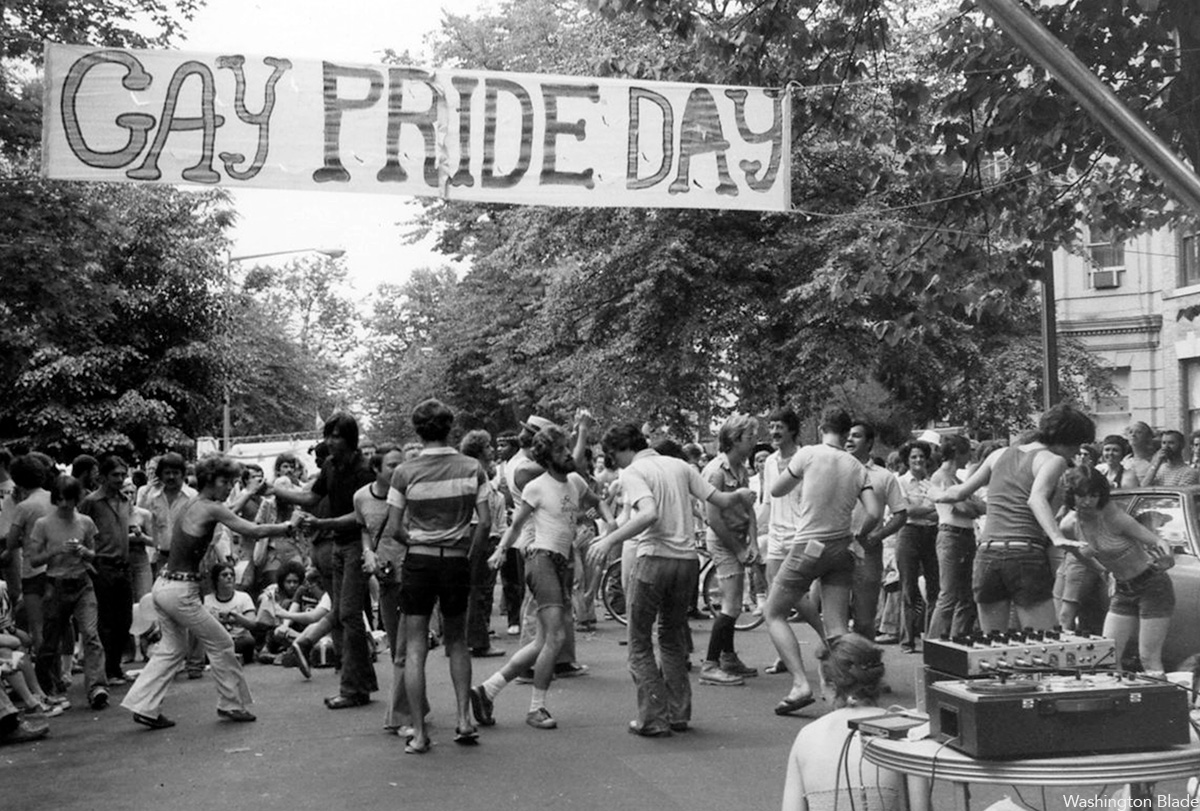
To celebrate the 50th anniversary of LGBTQ Pride in Washington, D.C., the Washington Blade team combed our archives and put together a glossy magazine showcasing five decades of celebrations in the city. Below is a sampling of images from the magazine but be sure to find a print copy starting this week.
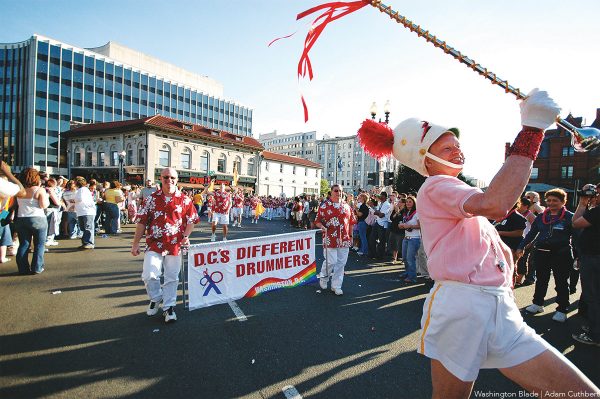
The magazine is being distributed now and is complimentary. You can find copies at LGBTQ bars and restaurants across the city. Or visit the Blade booth at the Pride festival on June 7 and 8 where we will distribute copies.
Thank you to our advertisers and sponsors, whose support has enabled us to distribute the magazine free of charge. And thanks to our dedicated team at the Blade, especially Photo Editor Michael Key, who spent many hours searching the archives for the best images, many of which are unique to the Blade and cannot be found elsewhere. And thanks to our dynamic production team of Meaghan Juba, who designed the magazine, and Phil Rockstroh who managed the process. Stephen Rutgers and Brian Pitts handled sales and marketing and staff writers Lou Chibbaro Jr., Christopher Kane, Michael K. Lavers, Joe Reberkenny along with freelancer and former Blade staffer Joey DiGuglielmo wrote the essays.

The magazine represents more than 50 years of hard work by countless reporters, editors, advertising sales reps, photographers, and other media professionals who have brought you the Washington Blade since 1969.
We hope you enjoy the magazine and keep it as a reminder of all the many ups and downs our local LGBTQ community has experienced over the past 50 years.
I hope you will consider supporting our vital mission by becoming a Blade member today. At a time when reliable, accurate LGBTQ news is more essential than ever, your contribution helps make it possible. With a monthly gift starting at just $7, you’ll ensure that the Blade remains a trusted, free resource for the community — now and for years to come. Click here to help fund LGBTQ journalism.
